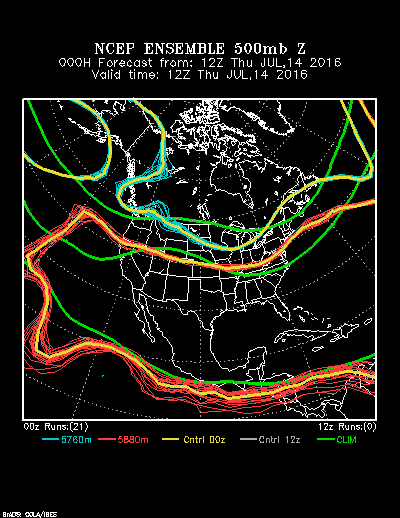84 F. average high on July 14.
84 F. high on July 14, 2015.
.06" rain fell at KMSP as of 8 pm yesterday.
July 15, 1980: Straight-line winds of nearly 100 mph cause enormous damage, mainly in Dakota County. 43 million dollars in damage is reported and 100 thousand people lose power.

A Dangerous Heat Wave Is Brewing For Next Week
I take my job seriously - I try not to take myself too seriously. In this space I often lead with a favorite quote, an anecdote or quip. Humor is attempted, because more than ever we need to laugh.
But I don't want to bury the lead or make light of what may evolve into a serious weather situation from the middle of next week into early August.
Meteorological ingredients are converging for a prolonged and extreme period of heat and humidity. By the latter half of next week afternoon temperatures may range from 95-100F, with dew points near 75F. Heat indices could be 105-110F, with lows not dipping below 80F in the downtowns.
In spite of sporadic A/C and beckoning lakes, relief from pervasive, sauna-like heat will be elusive. It's still early but I'm predicting significant risk for the elderly, the sick and people with little or no access to air conditioning.
I hope I'm wrong about this forecast.
In the meantime cool sunshine today gives way to a few T-storms this weekend. After a pleasant start next week will increasingly feel like a really bad mash-up of Arizona and Florida.
100-degree F. Surface Temperatures Possible by Thursday. Hard to imagine out there now, with a cool breeze and a September sky, but less than a week from now temperatures may surge into the upper 90s, even some lower 100s (most likely over central and western central Minnesota. Map: WeatherBell.
Peak Heat May Come Thursday. Check out the predicted (GFS) heat index next Thursday evening at 7 pm; as high as 110F in the Twin Cities metro and the southern half of Minnesota. Even people in good shape, well hydrated, can get into trouble with a heat index that high.

Twin Cities Heat Index and Dew Point History. It is quite possible that heat late next week will rival the heat observed in 1936, so this post is highly relevant. The Minnesota DNR takes a look at 100-degree heat and the history of dew point and heat index observations; here's the intro: "...Hitting
100 degrees is not a common occurrence for the Twin Cities metro area
and happens in about one in five years. The most recent 100 degree
reading occurred on July 4th and 6th of 2012. The hottest temperatures
in the Twin Cities occurred in July 1936, during the Dust Bowl era. An
all-time record of 108 degrees was observed on July 14, 1936. A high of
106 was recorded for each day from July 10th through the 12th in July
1936. In total an impressive 8 days in July 1936 were above 100 degrees,
with another day in August also above 100. This put the summer of 1936
at 9 days with temperatures at or above the century mark. This is a
record amount for the Twin Cities..."
Photo credit: "Cooling a Car in the 1930's." Courtesy: Minnesota Historical Society.
Map credit: "GFS model forecast massive heat dome centered over the central U.S. late next week." (WeatherBell.com).
U.S. Faces Dramatic Rise in Extreme Heat, Humidity. Climate Central has some timely perspective: "...Heat is the No.1 weather related killer, and as carbon pollution continues, global temperatures will keep climbing, bringing hotter summers and more extreme and dangerous heat. Climate Central's States at Risk project analyzed historic trends in summer temperatures since 1970 as well as projections for future extreme heat for hundreds of metro areas across the lower 48 states. Using several measures, our findings show that most U.S. cities have already experienced large increases in extreme summer heat and absolute humidity, which together can cause serious heat-related health problems..."
In Warming Oceans, Stronger Currents Releasing Heat in Bigger Storms, Study Says. InsideClimate News has a summary of recent research; here's an excerpt: "Global
warming is intensifying some of the world's most important ocean
currents, new research shows, raising the risk of damaging storms along
heavily populated coastlines of China and Japan. The findings are
sobering as China and Taiwan rebound from the devastating effects of
super typhoon Nepartak last week.
The western boundary currents, which run along the eastern coasts of
South Africa, Asia, Australasia, and South America, carry massive
amounts of heat from the tropics northward. The recent research by a group of scientists with the Alfred Wegener Institute Helmholtz Centre for Polar and Marine Research in Germany found they are strengthening, warming and moving poleward..."
Live Streaming Breaks Through, and Cable News Has Much To Fear.
A reminder that every industry is being disrupted. If you can go right
to the raw feed of breaking news, without an intermediary, why not?
Think Spotify, for news. Here's an excerpt from The New York Times: "...Historians of television news often cite the 1991 Gulf War as the breakthrough moment for cable
— a conflict that proved there was a market for round-the-clock
coverage of the sort that CNN was offering. For most humans, last week’s
police shootings, the subsequent protests and the mass assassination of
police officers in Dallas were a tragic commentary on modern American
race relations. But for that subspecies of humans known as television
executives, the events might also have functioned as an alarming peek at
a radically altered future. What we saw last week was live streaming’s
Gulf War, a moment that will catapult the technology into the center of
the news — and will begin to inexorably alter much of television news as
we know it. And that’s not a bad thing. Though it will shake up the
economics of TV, live streaming is opening up a much more compelling way
to watch the news..."

TODAY: Partly sunny, very nice. Winds: NW 5-10. High: 76
FRIDAY NIGHT: Partly cloudy, fairly comfortable. Low: 60
SATURDAY: Clouds increase, T-storms late. Winds: S 8-13. High: 82
SUNDAY: Sticky, few T-storms likely. Winds: SW 8-13. Wake-up: 65. High: 85
MONDAY: Blue sky, last comfortable day in sight. Winds: N 7-12. Wake-up: 63. High: 82
TUESDAY: Intervals of sun, feels stickier. Winds: SE 5-10. Wake-up: 68. High: 87
WEDNESDAY: Steamy sun, feels like upper 90s to 100F. Winds: S 10-20. Wake-up: 69. High: 91
THURSDAY: Blazing sun, dangerously hot - feels like 105F. Winds: SW 10-15. Wake-up: 75. High: 96
Climate Stories...
Image credit: "This July 13 image captured by a device on NASA’s Aqua satellite shows Franz Josef Land in the Arctic Ocean." (AFP/NASA)
State Attorneys General Subpoenaed by Rep. Lamar Smith for Exxon Fraud Probe. Here's the latest from InsideClimate News: "Rep.
Lamar Smith, chairman of the House Science Committee, escalated his
confrontation over the climate probes of ExxonMobil by issuing subpoenas
to two state attorneys general and several nongovernmental advocacy
groups on Wednesday. Smith (R-Tex.) announced the
action in a news conference on Capitol Hill, saying the attorneys
general of New York and Massachusetts were trying to criminalize the
opinions of people and companies who hold alternative views on climate
science..."
What Type of Climate Voter Are You? Here's a clip from Fusion: "A
new analysis has found that 10% of the population of voters are more
likely to vote for a candidate who opposes action on global warming.
Conducted by Yale University and George Mason University, the survey
found that Americans can be divided into six distinct groups when it
comes to climate and environmental voting preferences. Only members of
the most anti-climate action group, the Dismissive (10% of the
population; 10% of registered voters), are likely to vote for a
presidential candidate who actually prioritizes their opposition to
taking action to curtail human-caused climate change..." (Graphic: Yale University and George Mason University).
The Climate Anxiety Doctor is "In". Here's a clip from an article at Hakai Magazine: "...In the psychological literature, there is an increasing body of research demonstrating the toll that climate change
can take. Climate change can affect mental health both as a result of
individual significant weather events, and as a result of more gradual
changes in climate. Psychologists have found that catastrophic events
induce different mental health issues than gradual changes: catastrophic
events are more likely to induce trauma responses, major depression,
and complicated grief, while gradual changes can cause anxiety,
fatalism, and chronic depression. A common thread running through all
these effects is fear of an increasingly uncertain future, and the
anxiety that fear generates is often not constructively addressed..."
How Climate Change Could Threaten Wall Street? Think your portfolio is immune? Think again, according to a story at Christian Science Monitor: "Is climate change bad for business? According to the Global Risk Institute (GRI), a nonprofit based in Toronto, it may be. In a new report, GRI warned that global warming could present significant risks for financial institutions. “Given the financial service industry's heavily integrated role in society, it is particularly susceptible to the risks associated with climate change,” GRI wrote in its report. “It must therefore ensure that proper climate change strategies and risk management procedures are in place in order to remain viable...”
Photo credit: "A view of an oil refinery off the coast of Singapore, seen March 14, 2008. The Global Risk Institute is asking banks, insurers, and investors to shift their practices in light of climate change." Vivek Prakash/Reuters/File.
Meteorologist Need to Start Talking About Climate Change. No kidding. Here's a clip from Gizmodo: "...The role of the meteorologist in contemporary society is important but often invisible. They’re the people who remind us to grab a sweater or take an umbrella—sometimes on TV or the radio, more likely through a weather app on our phones. But they are also the only individuals that Americans receive advice from during potentially life-threatening weather. If a meteorologist is warning about an impending storm surge, wouldn’t it be helpful to know that those surges are likely to be worse due to rising sea levels—particularly if you live near the coast? “As a weather junkie as well as a climate scientist, I see it as our responsibility to include context,” Jason Samenow of the Capital Weather Gang told Gizmodo..."
Did you know you can create short links with AdFly and receive $$$$$ from every visit to your shortened urls.
ReplyDelete